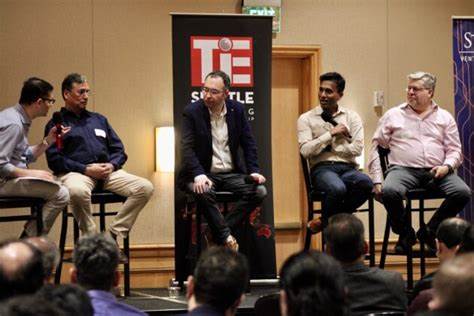
If you’re not spending time each day trying out new AI tools and understanding how the burgeoning technology may impact your work or life — you’re going to fall behind.
That was the message from a group of longtime technology leaders speaking about the future of artificial intelligence at the PAN-IIT Seattle 2024 Conference event in Bellevue, Wash., on Saturday.
“We are at a pivotal point in history,” said Oren Etzioni, a University of Washington computer science professor, founder of TrueMedia.org, and former CEO of the Allen Institute for AI. “And anybody who’s asleep, you’re going to miss it. So I encourage you to latch on to this.”
Joseph Sirosh, a former executive at Microsoft and Amazon, said the ability for AI to generate novel outputs marks a key paradigm shift and a “fundamental transition.”
“My first neural networks class was in spring of 1991. I’m an old AI guy,” said Sirosh. “It’s changed a lot since then.”
Sirosh betting big on generative AI — it’s the basis of his new startup, CreatorsAGI, which aims to let creators build their own conversational AI agents.
Generative AI allows for the creation of new products and services that simply weren’t feasible just a few years ago, said Vijay Mital, chief advisor for AI transformations at Microsoft.
But amid all the hype and funding, there are still plenty of limitations with AI.
In a recent column, Wall Street Journal tech columnist Christopher Mims pointed to a slowing rate of improvement and innovation. “It sure seems like the AI hype train is just leaving the station, and we should all hop aboard,” he wrote. “But significant disappointment may be on the horizon, both in terms of what AI can do, and the returns it will generate for investors.”
Etzioni, who is tackling political deepfakes at TrueMedia, said generative AI systems aren’t reliable in their current state and “you would not want an AI system to do most things right now.”
That fact is leading some to question what — if any — products using generative AI will actually be adopted broadly. Tech analyst Benedict Evans addressed this problem in a blog post Monday. “How do we build useful mass-market products around models that we should presume will be getting things ‘wrong’?” he wrote.
Jon Turow, a former computer vision leader at AWS leader, told the audience on Saturday that they should be experimenting with AI “to understand what this technology does and does not do.”
It’s clearly still very early days for this latest iteration of AI. But the panelists seemed to agree that the impact will be massive — if not in the next few years, certainly in the next few decades.
“We really are in a paradigm shift, in a tremendous transition,” said Etzioni. He added: “We know something big is happening.”


